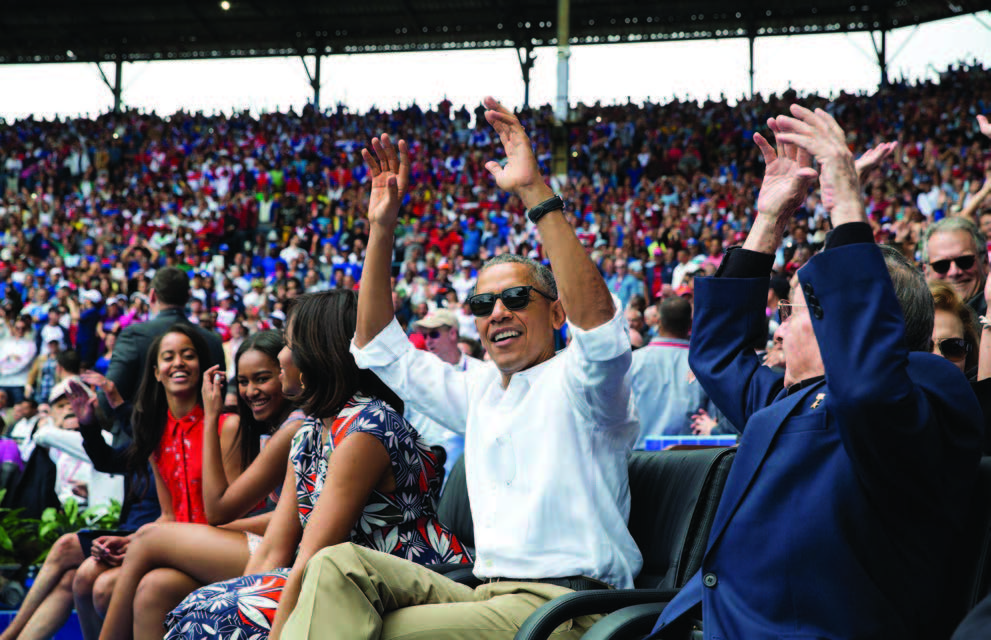
Despite Obama’s efforts, American-Cuban relations remain a mystery under Trump

On March 22, 2016, during an exhibition baseball game between the Tampa Bay Rays and the Cuban National Team in Havana, Cuba, President Obama and President Raúl Castro of Cuba spontaneously joined in ‘the wave’ that others in the crowd had started. President Obama has sought to normalize relations with Cuba. But the future of that relationship remains uncertain under the future administration of now President-elect Donald Trump. Photo courtesy of Pete Souza/The White House
By Barrington M. Salmon
Trice Edney News Wire
Uncertainty is the watchword for Cuba, its 11 million people and their future following the death of Fidel Alejandro Castro Ruz who held sway over the country for 50 years.
After President Raul Castro announced his brother’s Nov. 25 death, President-Elect Donald Trump and his soon-to-be Trump White House Chief of Staff Reince Priebus indicated Trump’s intention to force the Castro regime to renegotiate the terms of the deal by the Obama administration that normalized relations with Cuba after more than 50 years.
Trump said if the Cuban government doesn’t make concessions around Human Rights and opening up the economy, he plans to scuttle the deal.
Yet, there are many differing views about whether Trump will opt for a foreign policy platform that favors politics and the status quo, or one that tips toward enhancing both countries’ business ties.
In mid-December 2014, President Barack Obama announced the normalization of relations with Cuba which was followed by the easing of harsh economic sanctions imposed by successive US administrations since the early 1960s.
It is Congress, not Obama or Trump, which can lift the embargo, and there’s little indication – based on the comments of more than a few in that Republican-dominated body – that they’ll take that step.
Trump exulted on Castro’s death through two tweets. The first declared, “Fidel Castro is Dead!” followed by a sharper denunciation: “Today, the world marks the passing of a brutal dictator who oppressed his own people for nearly six decades. Fidel Castro’s legacy is one of firing squads, theft, unimaginable suffering, poverty and the denial of fundamental human rights.”
Obama struck a more conciliatory tone.
“We know that this moment fills Cubans — in Cuba and in the United States — with powerful emotions, recalling the countless ways in which Fidel Castro altered the course of individual lives, families, and of the Cuban nation,” he said. “History will record and judge the enormous impact of this singular figure on the people and world around him.”
What happens now is as uncertain as Castro’s legacy.
His death triggered celebrations in Cuban émigré enclaves in South Florida while elsewhere, there was an outpouring of grief for a man hailed by some as a revolutionary and liberator and excoriated by critics as a tyrant and dictator who held his island-nation hostage since 1959.
After hundreds of thousands of Cubans paid their respects by honoring Castro in a number of official events, and mass gatherings to celebrate his life, Castro’s ashes were interred in a public-private ceremony on Dec. 4 at the Santa Ifigenia Cemetery in Santiago de Cuba. Santiago is the island’s second largest city and site of the putative beginning of the Cuban Revolution in 1953.
Lourdes Matos, a Cuban native and South Florida resident, said Castro’s death gives her no joy.
“I was saddened and as a matter of fact. I learned about it at 2 a.m. I woke up, was flipping through channels and saw the news,” she said during a recent interview. “The reason it saddened me is because of my mom Gliserda who was a true Cuban and Republican. I remember hearing her say that she wouldn’t go back to Cuba until Castro left power.”
On the other hand, Graciela Cuevas, born in Cuba but who grew up in the US and who visited relatives on the island recently, said the view of Cuba’s future depends on who you ask.
“Those who have family members in the US, Mexico or wherever, who are willing to invest in a business in Cuba see great possibilities, particularly if the US blockade is lifted and US tourists flock into the island,” she explained. “The ones whose only perspective is to keep living from state-run enterprises feel that life will continue to be a struggle for food, clothing, housing and medicines, as usual.”
Cuevas, who lives in South America, said her support for the Cuban Revolution has been tempered by the realities of what she’s seen and recognition of where it has fallen short.
“Most people in Havana live in dire conditions in the so-called ‘solares’ which are essentially the decayed buildings which were once the dwellings of Havana’s middle and upper class,” she said. “These buildings have had close-to-no maintenance in over 56 years! Most of the ceilings have fallen, the pipes have been patched up and are still the original ones from when the buildings were built. Cuban life is difficult as most Cubans will tell you over and over again.”
Cuevas acknowledges Castro’s legacy but questions the price Cubans have paid.
“Sure, there have been advancements in education and medicine but, really, is a Marxist-Leninist revolution necessary to offer free education and achieve some medical benefits?” she asked. “Is it necessary to execute, exile and oppress the opposition for those achievements? When you walk the streets of Havana, when you talk to people and listen to their difficulties, one can’t come to the conclusion that Fidel’s revolution really achieved what it set out to achieve.”







